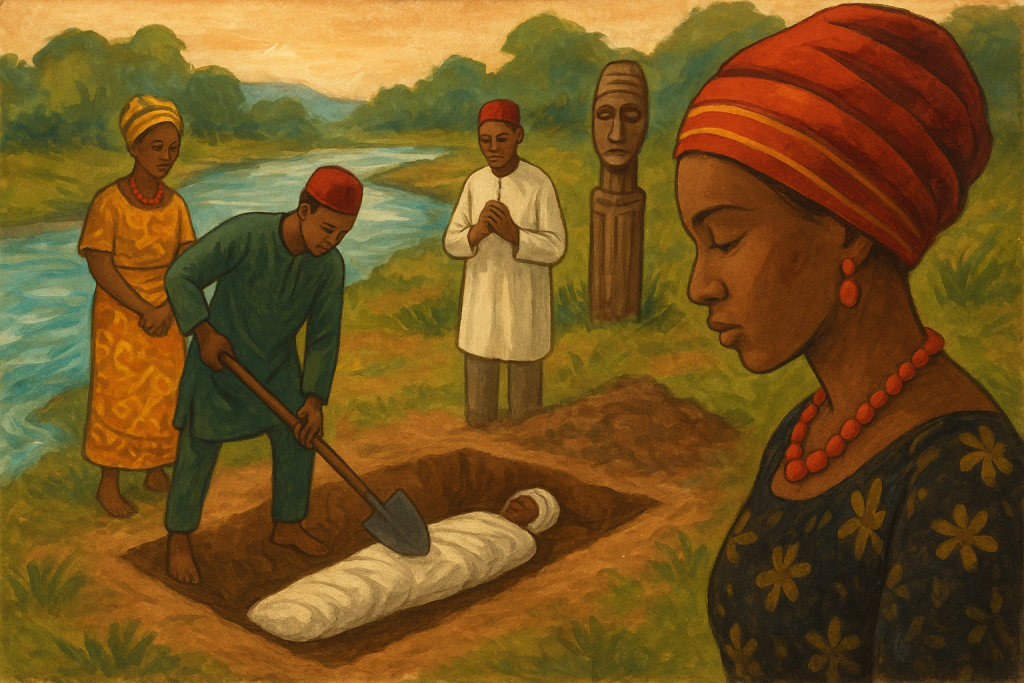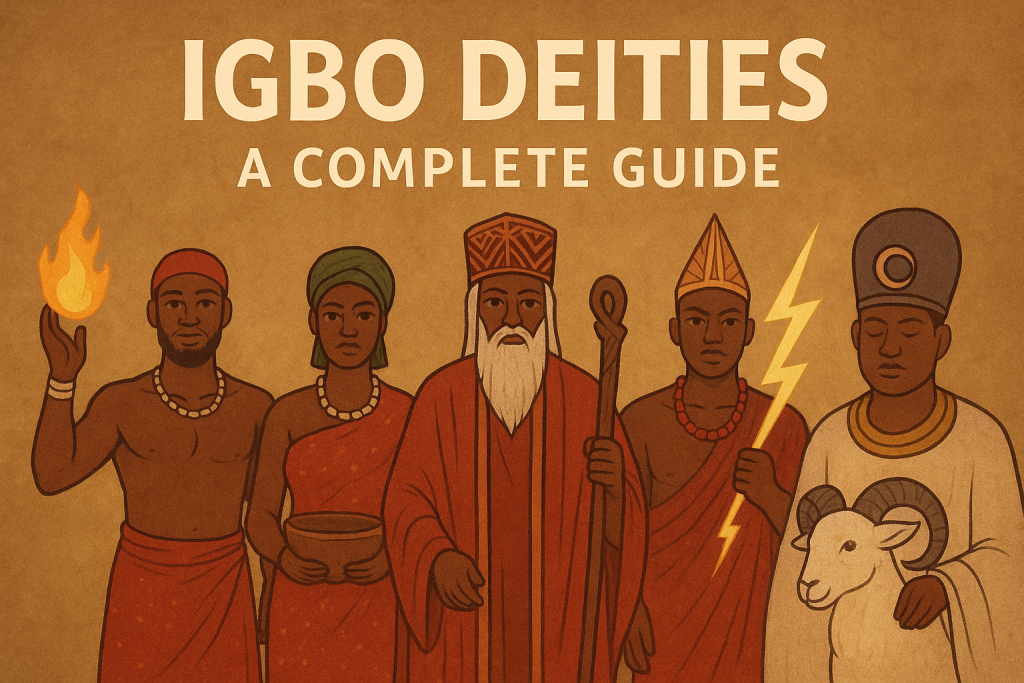Igbo Dieties: Names, Roles, and Beliefs
There are over 100 deities in Igbo culture, both major and minor, yet most people today know very little about them—except perhaps one or two. This loss of knowledge is deeply tied to the impact of colonialism and the spread of Christianity, which pushed many Africans to abandon their indigenous spirituality.
Among the Igbo people of southeastern Nigeria, there are countless deities, each connected to specific communities and traditions. Many of these spiritual beings are known only within certain villages, where their influence is tied to local customs and geography. In such settings, it is common for each village to honor its own deity, with a chief priest serving as the mediator between the people and the spiritual force.
While these local deities are important, this discussion focuses on those that hold wider cultural recognition across Igboland—the major gods and goddesses whose power and reverence extend beyond individual villages. These include deities such as Anyanwu, Amadioha, and others whose presence is felt throughout.
1. Chukwu (The Supreme God)
Chukwu, meaning “The Great Spirit,” is regarded as the supreme creator in Igbo cosmology. He is the source of life, the giver of rain, fertility, and destiny. Unlike the other gods, Chukwu is seen as distant and not directly worshipped. Instead, the Igbo people honor him through lesser deities who serve as intermediaries.
Chukwu represents the unity of all things—spiritual and physical—and is often compared to a sky deity because of his all-encompassing power.wu –
2. Anyawu (The Eye of The Sun)
The name Anyanwu comes from two Igbo words: anya (eye) and anwụ (sun), which together mean “eye of the sun.” Beyond the literal meaning, Anyanwu represents the sun and is revered in Igbo traditional religion as the sun deity, often called the “eye of the light.”
The theology of Anyanwu goes beyond physical sight. The sun is associated with enlightenment, vision, and foresight. Metaphorically, it symbolizes insight, the ability to understand truth at a deeper level and foresight, the capacity to perceive what lies ahead. In this sense, Anyanwu was not only a provider of warmth and light but also a spiritual source of wisdom and guidance.
the Igbo veneration of Anyanwu reflects the central role of the sun in human survival and spirituality. The sun governs time, seasons, and agriculture, and for centuries has shaped calendars, festivals, and even astrology across cultures.
Among the Igbo, sacrifices to Chukwu (the Supreme God) were sometimes made through Anyanwu because of the close link between the sun and the divine. This underscores the sun’s place as both a physical and spiritual bridge between humanity and the Creator.
The cultural significance of Anyanwu is also preserved in art and ritual In essence, Anyanwu embodies illumination, clarity, and divine vision. The deity inspires human beings to seek truth, to see reality clearly, and to look ahead with wisdom and foresight.
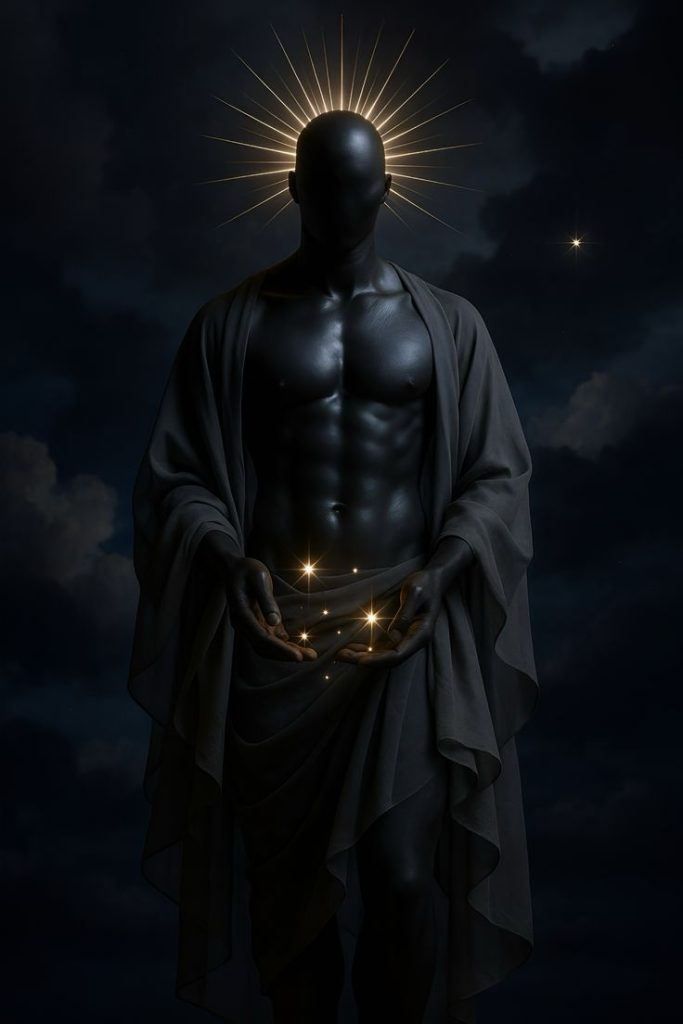
3. Amadioha (The God of Thunder and Lightening)
Amadioha, often called eligwe (meaning “sky”), is one of the most revered deities in Igbo cosmology. Sometimes also known as Amadiora or Kamalu in different regions, Amadioha is believed to be the son of Chineke (the Creator) and, in some traditions, the spiritual husband of Ala, the Earth goddess. His color is red, his sacred symbol is the white ram, and his day of worship falls on the Afo market day. This explains why white rams are traditionally offered during his sacrifices.
Amadioha is more than just the thunder god. He is widely recognized as the embodiment of justice, punishing wrongdoers and protecting the weak. To the Igbos, he represents fairness, balance, and the principle that “whatever a person sows, they will surely reap.” While his thunder and lightning strike fear, he is also seen as a gentle deity who only displays his wrath when justice is demanded. In this role, he acts as the divine enforcer of Chukwu’s will.
Beyond justice, Amadioha is also regarded as the god of peace, love, unity, and prosperity. Many communities believe he blesses hard work and enterprise, bringing personal wealth and collective progress. His very name translates to “man of the people,” symbolizing his role as the voice of the community.
Amadioha is closely associated with Anyanwu, the sun god, whose influence is strongest in northern Igboland, while Amadioha is especially venerated in the south. However, his influence spans the entire Igbo world. Comparatively, he is likened to Shango, the Yoruba god of thunder and lightning, as well as similar deities in other West African cultures.
Whenever lightning strikes a person or object, it is believed to be a direct sign from Amadioha. Traditionally, a dibia (priest) would be consulted to determine the cause, often linking the strike to a hidden wrongdoing. In this way, thunder and lightning serve as his tools of justice—exposing evil, destroying harmful charms, and restoring the natural order.
Shrines dedicated to Amadioha are easily recognizable. They are usually found in thick groves surrounded by towering trees and filled with sacred objects like broken pots, horns, knives, gongs, feathers, and charms. A long bamboo pole suspended between forked sticks, smeared with sacrificial blood, often marks the shrine.
It is believed that no wrongdoer can pass under it unpunished, Despite his fearsome association with thunder, Amadioha is ultimately a protector, provider, and enforcer of divine order. Through him, the Igbo people connect to the justice, blessings, and authority of the heavens.
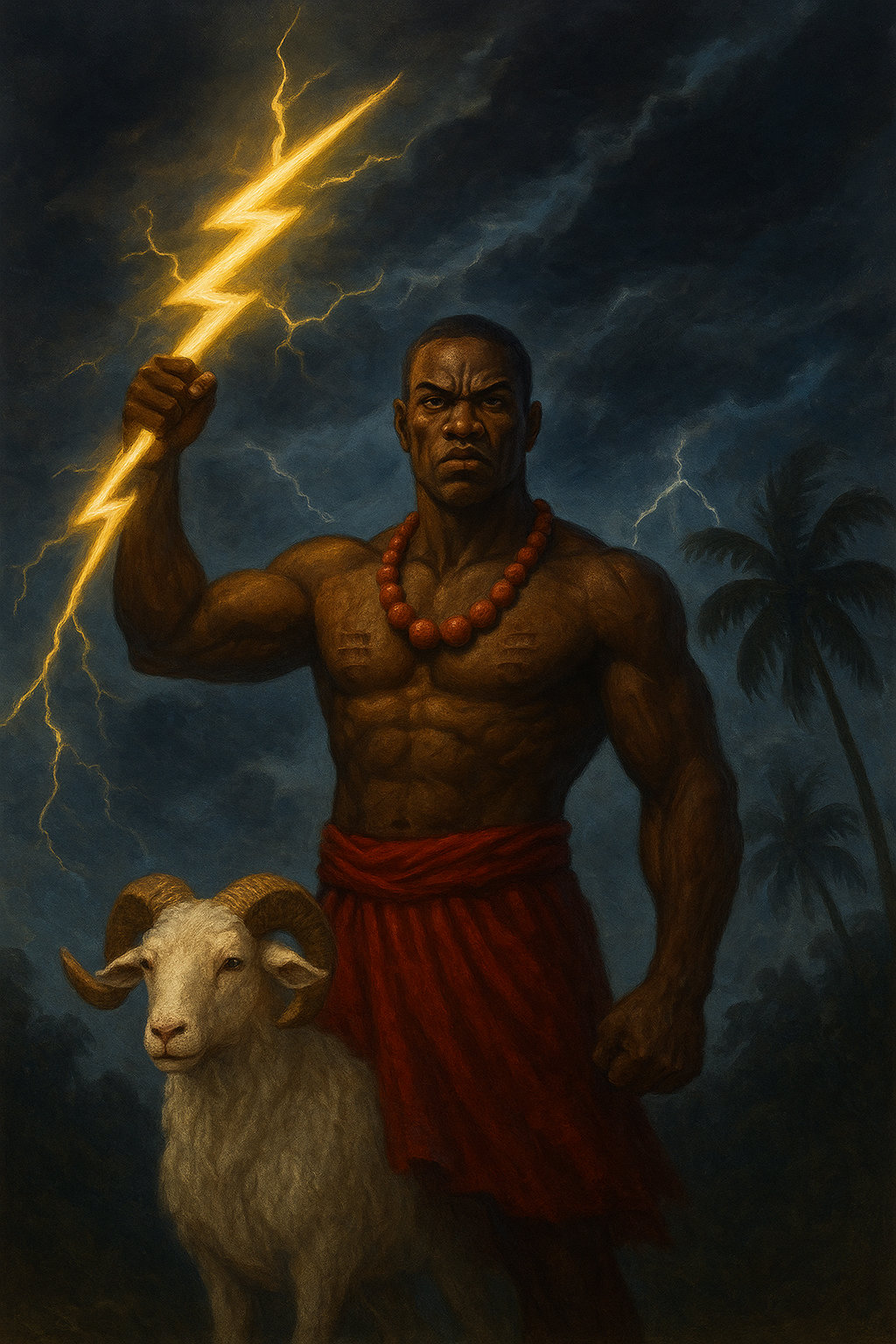
4. Ala ( Earth Goddess)
Among the Igbo, Ala (Ani) is regarded as the most powerful and revered deity, both in public and private life. She is considered the only daughter of Chukwu, entrusted with shaping the earth and giving rise to vegetation. In Igbo spirituality, Ala is celebrated as the goddess of fertility, morality, and prosperity, often referred to as the custodian of both divine order and human conduct.
The Igbos hold the earth sacred, believing it to be the source of all living beings and the passageway back to Chineke (the Creator). To sin against morality is described as imebi Ala (defiling the earth), If a wrongdoer dies without making amends (imejuo Ala), tradition holds that the goddess rejects their body, sometimes causing the corpse to be expelled from the ground. Such a fate means the soul is lost, unable to reincarnate, becoming a restless, wandering spirit.
While Chukwu is seen as the creator, Ala is the preserver and enforcer of divine law. She is often represented as a pregnant figure, symbolizing the womb that nurtures life and renews creation. For the Igbos, an agricultural people, Ala is the “mother of crops.” Before planting and at harvest, rituals and sacrifices are offered to her—seeking her blessings for fertile soil or giving thanks for abundant yield. During years of drought or crop failure, people consult her shrines to find out whether they have offended her, performing rituals of appeasement before turning to natural explanations.
Ala is also linked with Amadioha, the god of thunder, and together they represent the balance of sky and earth. Her sacred symbols include the python, a creature never to be harmed and the crescent moon, both reflecting her power over life, fertility, and the natural order.
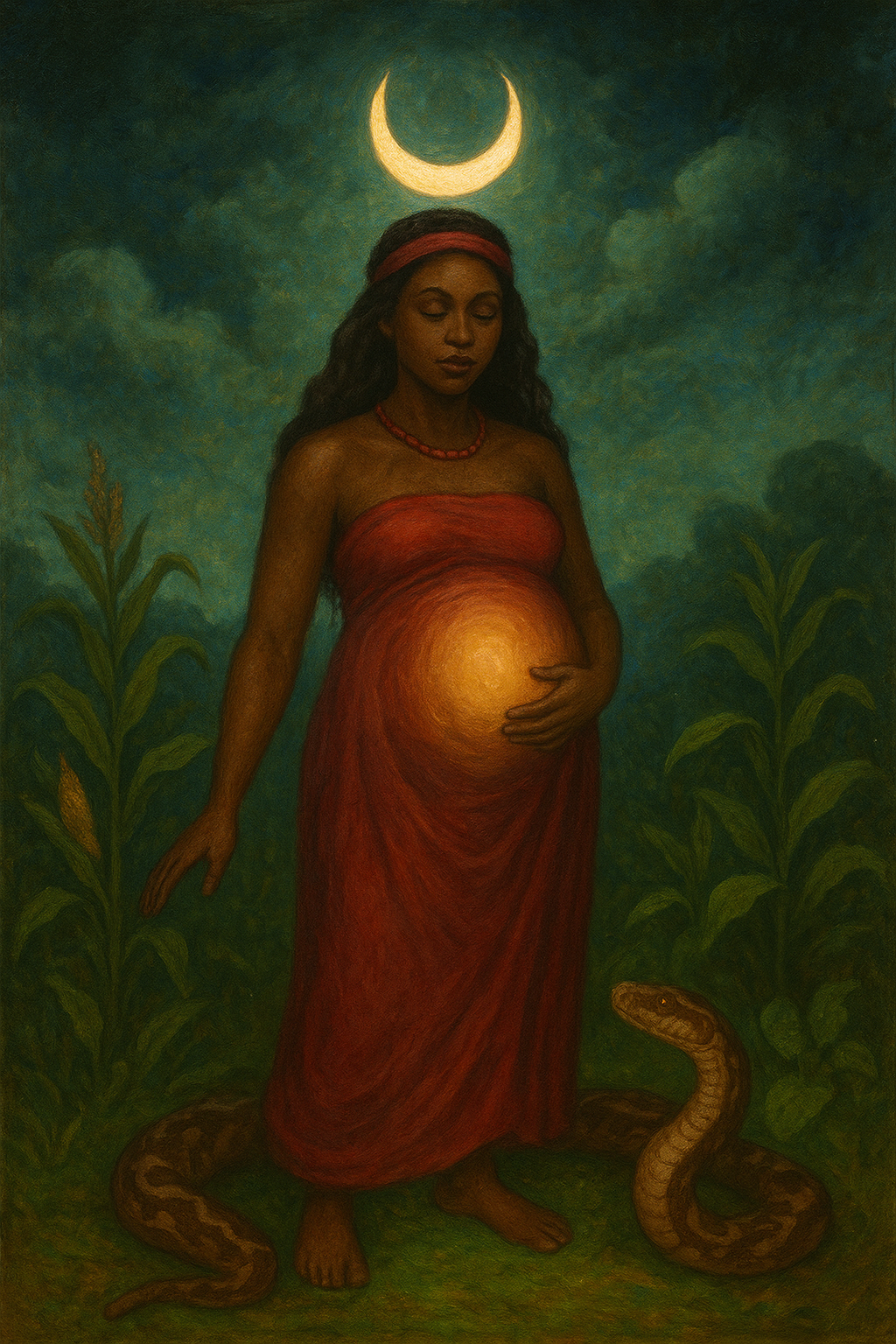
5. Agwu (Patron Spirit of Diviners)
Agwu, sometimes called Agwusi, is regarded in Igbo cosmology as a trickster deity, similar in role to Ekwensu in Igbo belief, Esu among the Yoruba, and Ananse in Akan traditions. Within the Igbo worldview, Agwu represents a fundamental principle used to explain the dualities of human existence; good and evil, health and sickness, prosperity and poverty, fortune and misfortune. Like deities such as Anyanwu, Amadioha, and Ala, Agwu is believed to originate from Chukwu Okike, the Supreme Creator.
The unpredictable ways in which Agwu manifests in people’s lives sometimes its presence is revealed through business collapse, sudden accidents, or mental disorientation. A person believed to be under Agwu’s influence may hold a key in hand yet search endlessly for it, symbolizing confusion, forgetfulness, and emotional imbalance. In this way, Agwu is seen as a spirit that causes both psychological and social disruptions and yet, just as Agwu can bring chaos, it may also bestow blessings: health, wealth, or creative inspiration. This duality makes Agwu both feared and revered.
Unlike a mere spirit-force, Agwu is seen as intelligent and willful, capable of assuming male or female forms and playing different roles at will. It is regarded as the divine messenger of Chukwu, inspiring exceptional talent and wisdom. Agwu describing itself as “the spark of Divine Essence”, responsible for equipping humanity with the knowledge and tools necessary for survival and progress in science, philosophy, spirituality, and mysticism.
In Igbo practice, invoking Agwu’s power is as simple as standing barefoot on the earth, lifting one’s hands, and solemnly declaring: “Agwu gosi m ike gi!” (Agwu, show me your power). Such rituals highlight the awe and reverence attached to the deity.
In traditional society, Agwu was especially respected among diviners (ndi dibia), who relied on clarity of thought for their work. Because Agwu could either scatter or sharpen the mind, every dibia began the day with prayers and praise to Agwu, often with rhythmic tortoise-shell chants. As the patron of diviners, Agwu is believed to possess and guide those called into the practice of healing and divination.
However, Agwu’s blessing comes with strict moral expectations. Diviners must follow its directives with discipline: avoiding greed, refraining from exploiting clients, observing taboos (such as sexual abstinence during menstruation or avoiding funerals of those of questionable character), and practicing compassion. When these rules are kept, Agwu rewards generously. But misrepresentation or misuse of its power brings grave consequences.
Thus, Agwu embodies both chaos and order, confusion and wisdom. It is the spirit that tests, disciplines, inspires, and ultimately reveals the hidden mysteries of existence to those who seek and honor it.

6. Nmuo Mmiri or Nne Mmiri (The Water goddess)
In African cosmology, the natural world is alive with spirits. They dwell in mountains, trees, rivers, seas, oceans, skies, and even beneath the ground. Among the most revered of these spiritual beings are the water deities, widely known as Mammy Water or Mami Wata—a figure celebrated across cultures and languages, from pidgin English to various indigenous tongues.
In Igbo tradition, the equivalent of Mami Wata is Nmuo Mmiri, a female deity of many names and countless attributes. She is regarded as the sustainer of aquatic life, a bringer of hope, a protector, and a generous provider of blessings. Her gifts often appear as wealth, beauty, fertility, or rare treasures from distant lands. The Igbo believe she holds the key to the mystical gates of solutions, and so prayers often include the phrase “ka uzo anyi buru uzo mmiri”—“may our journey follow the path of the stream”—a call for her guidance in safe travels and successful ventures.
Mmuo Mmiri are known for their dual nature, they embody both benevolence and malevolence depending on how they are treated by mortals. On the one hand, they are generous spirits who bestow blessings upon their devotees. Those who honor and respect Mmuo Mmiri may receive gifts in form of divine favor such as fertility, love, beauty, and wealth. These blessings are seen as rewards for devotion and reverence, making Mmuo Mmiri highly venerated among those seeking prosperity and happiness.
Though celebrated for her beauty, generosity, and brilliance, she can also be unpredictable, bringing storms, illness, or even death when displeased. Unlike Ala, the earth goddess, Nne Mmiri is said to take multiple spouses and is believed to bless her followers with children, health, food, and prosperity.
Her sacred animals are python, crocodile, and tortoise which serve as her living icons among the Igbo. As the feminine force of the Igbo spiritual universe, Nne Mmiri represents creativity, resilience, and the heights of female achievement. She is not only a guardian of the waters but also a reminder of the boundless power and mystery carried by the feminine divine.
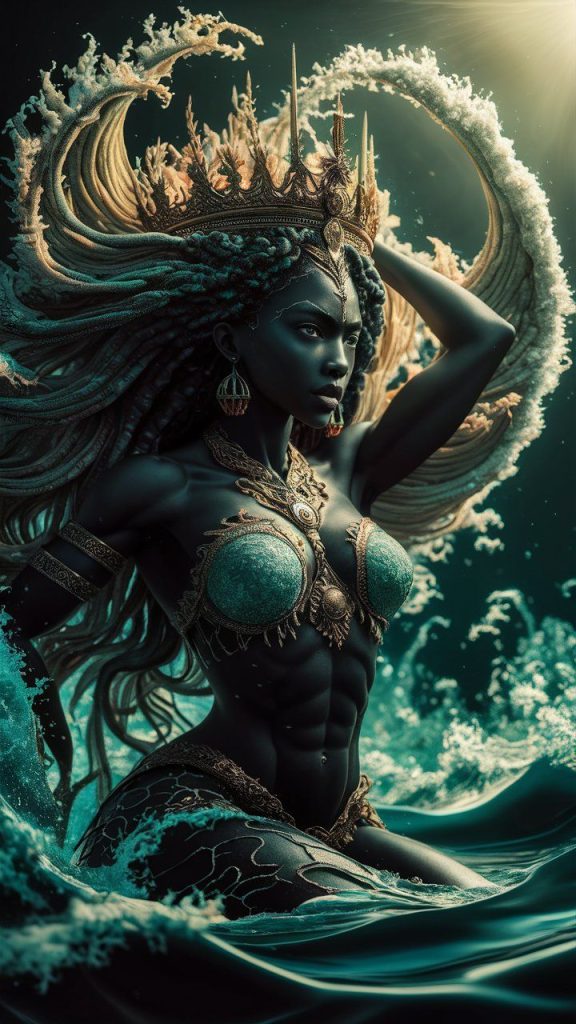
7. Ekwensu (The god of Warriors)
When you hear the name Ekwensu, what comes to mind? For many, especially after the arrival of Christian missionaries, it is equated with the devil, the embodiment of lies, chaos, and evil. But in Igbo cosmology, Ekwensu was never the Christian devil. He was something far more complex, both feared and respected as a force of power, chaos, and change.
Alongside Ala, the earth goddess, and Amadioha, the thunder god, Ekwensu was counted among the greatest deities of the ancient Igbo. He was known as the spirit of violence, patron of warriors, and master of cunning negotiations. Much like Esu in Yoruba tradition or Kratos in Greek mythology, Ekwensu symbolized strength, restlessness, and the unpredictability of human and natural forces.
Ekwensu was invoked in times of war, when courage, strategy, and sheer ferocity were needed. Among the Igbo of Asaba, an Ekwensu Festival was once held as a major annual celebration, showcasing military might and bravery. Warriors even built shrines to him before battle, only to destroy them after victory lest his fiery influence linger and spark unnecessary bloodshed during peacetime.
Still, there was a dangerous side. Ekwensu represented chaos itself—the unpredictable side of human nature and the universe. Death was said to be his constant companion. Those who were quick to anger, violent, or suddenly overcome by uncontrollable impulses were believed to be possessed by him. When unimaginable acts of cruelty occurred, the Igbo often explained them as the work of Ekwensu, acknowledging that sometimes human depravity seems to reach beyond ordinary comprehension.
It’s easy to see why early missionaries, unfamiliar with Igbo thought, rushed to equate Ekwensu with Lucifer. But in truth, Ekwensu was never an absolute figure of evil. He was a testing force of Chukwu, a necessary counterbalance in the cosmic order, embodying both the destructive and transformative energies that drive change.
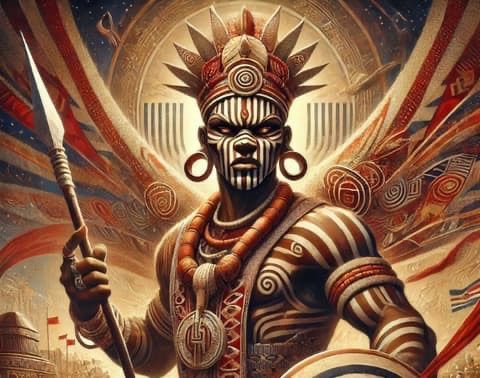
8. Ogbunabali (The Fearsome Igbo God of Death and Justice)
In Igbo spirituality, some deities inspire love and devotion, while others inspire awe and fear. Ogbunabali whose name literally means “the one who kills at night” belongs to the latter. He is both dreaded and respected, the god of death and divine justice, the shadowy enforcer who reminds humanity that no wrongdoing goes unpunished.
Ogbunabali’s presence is a paradox. On one hand, he is terrifying, the embodiment of death and destruction. On the other, he is a guardian of order, ensuring that the laws of the gods are upheld and that cosmic balance is maintained. In the eyes of the Igbo, he is not evil for evil’s sake; rather, he is a necessary force of justice, intervening only when human actions cross the sacred line.
Ogbunabali’s role is clear he punishes severe transgressions, especially when humans break covenants with the gods. Wrongdoing against the divine is never taken lightly, and when the offense is grave enough, Ogbunabali is dispatched as the ultimate enforcer. Moving silently under the cover of night, he seeks out those guilty of such violations, dealing swift and irreversible judgment.
His symbol—the human skull is a chilling reminder of mortality and the weight of divine justice. To encounter Ogbunabali is to face the finality of death, a warning that some boundaries should never be crossed
Ogbunabali is closely associated with Ekwensu, the Igbo trickster and spirit of war. The two share a sibling-like relationship sometimes cooperating as enforcers of cosmic order, other times clashing in their opposing approaches to chaos and justice. Together, they reveal the complexity of Igbo cosmology, where even fearsome forces serve a greater divine balance.
Ogbunabali also presides over the sacred world of mmonwu (masquerade societies), which bridge the realms of the living and the dead. Masquerades often embody ancestral spirits, and because they deal so directly with death, they fall under Ogbunabali’s watchful eye. Any violation of masquerade traditions—whether through disrespect, deceit, or sacrilege—invites his swift and merciless punishment.
Summoning Ogbunabali is no light matter. It is often attempted through masquerades crafted in his likeness, but to call on him directly is considered dangerous, even arrogant. Those who try risk invoking his wrath instead of his favor, for the god of death is not one to be summoned casually.

Final Thoughts
What do you think of these dieties? Which do you know? or which does your community still serve?
comment below as i can’t wait to hear your views…

